Following the recent post about Little Rock Mayor Frank Scott Jr., his meddling in the city’s response to an AFOIA request related to a 2020 Request for Qualifications, and the questionable overlap between that RFQ and multiple Scott campaign donors, one question that popped up a couple places was why Gerald Alley and/or Sam Alley would get involved in such a plan. After all, what was some percentage of $49,140 for two guys worth orders of magnitude more money?
That was a good question, so I decided to track down the answer.
***
Regarding RFQ 840, I asked City Director Capi Peck why she thought Mayor Scott and Jamie Collins would go to such lengths to get A Squared Global that contract. Director Peck responded, “In my conversation with Jamie Collins on Thursday, 10/27, [when] he was explaining RFQ 840 to me, he mentioned that the $49,140 was within the mayor’s spending limit. He then said that, if the [Rebuild the Rock] sales-tax initiative had passed, they would have then proceeded with phases 2 & 3 and would have gone to a sole-source provider…the ‘winner’ of the phase 1 bid.”
A “sole-source provider” situation arises when the procurement director or someone higher up the food chain determines in writing that “it is not practicable” to use anyone other than the single, specified source to provide a certain good or service. These generally come up in situations like police body cameras, where there is only one company that makes the specific kind of camera needed. In those instances, the city does not have to open bids for other companies to possibly compete for the contract, and the sole-source provider gets the contract without competitively bidding for it.
Here, it is unclear what proprietary or specific information that A Squared Global, LLC, would possibly have had from “studying” three areas of town1 that would have made hiring another company to do the actual revitalization/construction work impractical. Assuming that A Squared Global produced an actual report with information related to the three areas, such as utilities, needs, demographics, etc., it’s hard to fathom a scenario where another construction company could not have used that information to craft a competitive bid to provide the future work.
Yet that is apparently what A Squared Global was going to be able to claim. Mayor Scott or Jamie Collins or whomever would have simply said that it was “impracticable” to hire anyone but A Squared to do phase 2 or phase 3, and A Squared would have had the far larger second and third contracts based only on having been given the first contract.
While we don’t know what the phase 2 and phase 3 contracts would have been worth, they would have involved actual construction and architecture work and the like. So it seems exceedingly fair to assume that they would have been worth far more than $49,140.
***
This “sole-source” plan makes the efforts to rig the bid for A Squared make more sense, too.
Recall, in responding to the bad press about RFQ 840 and the mayor’s tampering with Collins’ AFOIA response, Aaron Sadler claimed that the mayor had no role in the awarding of a contract to A Squared Global under RFQ 840. Except we know that’s false, because Scott is the one who personally approved (in writing) a selection committee for RFQ 840 that was comprised of Charles Blake, Jamie Collins, Kendra Pruitt, Emily Cox, and John Eckart.
Little Rock Municipal Code Sec. 2-243(d) states (emphasis added):
The competitive selection for such services shall be conducted by a review committee which has been selected by the appropriate governing board, commission or authority as the case may be, which shall include appropriate city personnel and professionals, and/or individuals with community expertise based on the nature of the services to be selected. The review committee for each proposed contract shall establish the qualifications and evaluation criteria necessary for the specific services to be provided.
Now look at that selection committee again. Charles Blake is a former legislator who was then Scott’s Chief of Staff. Kendra Pruitt is a lawyer2 and was then a “senior advisor” to Scott. Emily Cox worked with Scott in Gov. Beebe’s office and now works as “Intergovernmental Relations Manager” for the City of Little Rock. None of them would have any role in a selection process that was truly looking for the best response, rather than just rigging the scoring so that Mayor Scott’s favored applicant would win. Yet, here they are.
What is weird–and, by “weird,” I mean “shady”–is that there are no individual score sheets for each of the responses to the RFQ. There are only cumulative scores, meaning it’s impossible to see what each member of the selection committee gave as scores. This is the first time I have ever been unable to obtain the individual score sheets for RFQ responses. Hell, even the LITfest debacle, where Think Rubix was the only entity that responded to the RFQ, had individual score sheets available.
Here? Nope. Just cumulative spreadsheets of scores, two of which are somehow identical (despite this supposedly being a process where each person scored everything individually), two of which have barely any scoring on them for any of the proposals, and one of which appears to be missing since there were five people on the committee and I only received four of these spreadsheets.
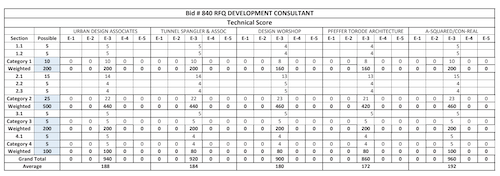
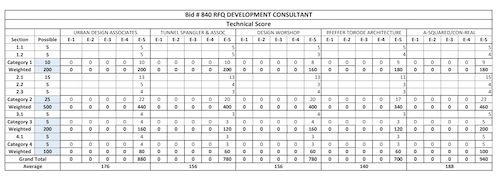
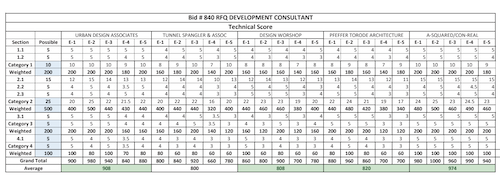
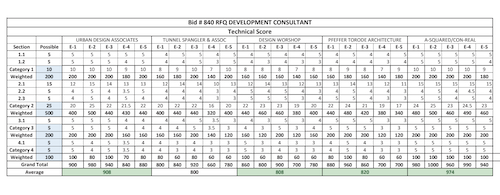
Now, even with the weird scoring sheets, if A Squared Global’s presentation was head and shoulders above the rest of the applicants, maybe this can all be explained in some way that makes it less bad.
Except…well…here is the sum total of the actual proposal of work to be done that was contained in the A Squared response:
That’s the kind of bare bones response you might expect from a company that formed literally the day before the response was due.
Now, compare that with the relevant parts of the other responses received:
Maybe the A Squared proposal is comparable to the PTA proposal (the second one shown above), but you cannot sit there with a straight face and say that A Squared’s proposal is in the same universe as the Design Workshop or UDA proposals, let alone better than those. Yet that’s exactly what the hand-picked committee determined.
Based on the committee’s scoring, A Squared wound up with a contract that specifically states that it is for A Squared to provide “an economic impact study,” “a preliminary market feasibility study,” and “a preliminary master plan,” in exchange for $49,140.3 Regarding payment of that amount, the contract specifies:
4.02. Method of Payment. Payment to Consultant for services provided pursuant to this Agreement shall be made in monthly installments based on approved invoices for services described in Exhibit A.
4.03. Requests for Payment. The Consultant shall submit an invoice for each payment request, detailing the services provided as of the date of the invoice. Invoices shall be submitted to Jamie Collins at Little Rock Planning and Development, 723 West Markham Street, Little Rock, Arkansas 72201.
It appears that neither the city nor A Squared had any intention of abiding by those provisions of the contract, however. A Squared signed the contract on March 17, 2021. The city signed on May 4, 2021. Despite the contract calling for monthly installments/invoices, A Squared submitted nothing for payment until a final invoice for the full amount in February 2022.
Worse, despite the contract explicitly stating that the invoices must detail the services provided, the invoice that was actually submitted has literally no detail about any services provided whatsoever. Nevertheless, the full $49,100 amount was paid based on A Squared throwing together a Power Power presentation that demonstrates maybe 10 hours of work between the research and compilation of that presentation.
I mean, the filename on the A Squared presentation was literally “A2-Little-Rock-Presentation_2-18-22-Draft1.” Nearly all of the slides have “DRAFT” as a background watermark.
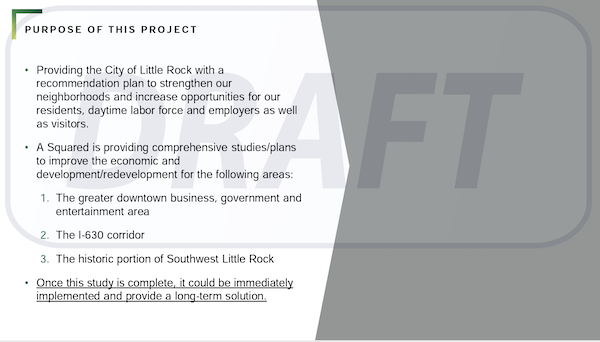
Of the whopping 23 slides in that draft presentation:
- Six (6) are just headings/section markers with generic photos and no content;
- Three (3) are about A Squared and just give bios of the Alleys or an org chart, but contain no information regarding the project;
- Six (6) are maps that were defined in the RFQ with some additional labeling by A Squared;
- Three (3) are copypasta from the RFQ and/or A Squared’s response to the RFQ, all of which are just summaries of what was already defined as the scope of the project;
- One (1) is this meaningless “chart” that conveys zero useful information to someone reading the presentation; leaving exactly
- Four (4) with anything resembling actual information gathered, compiled, and provided by A Squared pursuant to the contract.
So, in the spirit of being thorough, let’s look at all four of the substantive slides that A Squared produced and determine if we think that information is worth $49,140 in taxpayer funds:
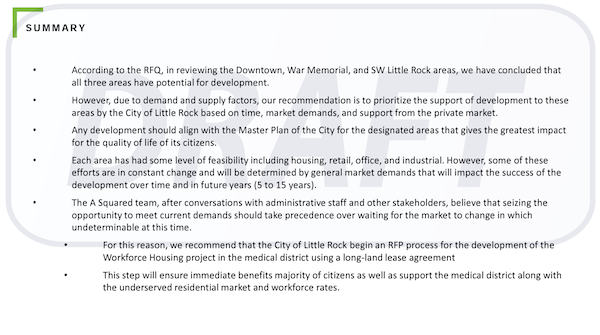
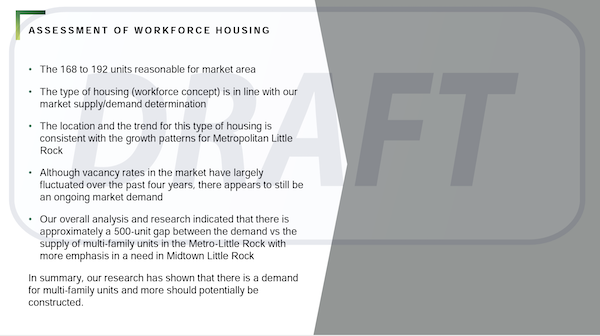
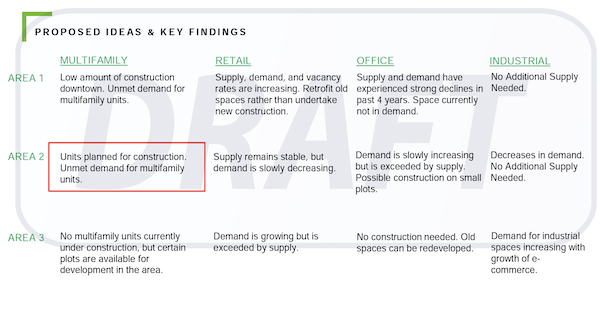
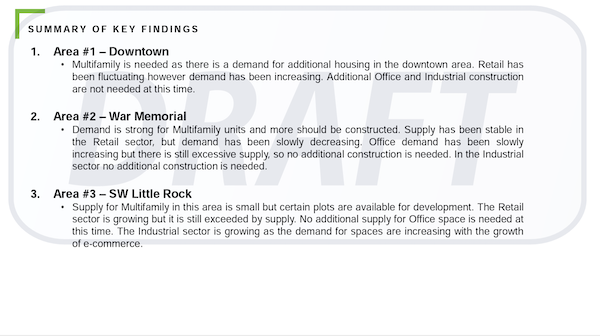
By my count, if we’re generous in what we define as a sentence, there are 42 sentences across those four slides. The overall conclusion is, essentially, build more housing in these areas. Maybe build some other stuff if demand increases.
Any time you can lock up that level of insight for $1,170 per sentence, you just have to do it. Every municipality knows that.
***
I have looked at that presentation at least twenty times now, and I continue to be struck by how little effort went into it. It is the kind of thing you would turn in when you totally forgot the project was due tomorrow and you had about 9 hours to get it done. Even then, you’d be hoping for nothing more than a C on the final project. You certainly wouldn’t expect to earn 100% on something that was so clearly devoid of effort, and that is true whether 100% would be an A+ or $49,140 under a contract that called for much more than what you turned in.
At the end of the day, it is the full payment of the contract amount, based on an invoice with zero detail about work that was done, for a Power Point presentation that fails to address several of the contract responsibilities and lacks any real actionable plans, that bugs me the most. Whether we’re talking about LITfest or this boondoggle, I keep trying (and failing) to come up with a good reason for why the contracted entities keep getting paid so much money when they fail to even meet the bare minimum requirements and duties in the contracts they’ve signed.
Is the point of these contracts to actually accomplish something for the city, or is it just to get money to people who support Frank Scott Jr.? If it’s the former, then this approach has failed spectacularly; if it’s the latter, then we have bigger issues.
Whatever the reason, this much seems indisputable: we may disagree on whether Frank Scott Jr. has been a good mayor, but he’s certainly been a profitable mayor for those lucky enough to be part of his inner circle.
***
If you like what we are doing here and find Blue Hog Report to be a valuable part of Arkansas politics, please consider subscribing to our Patreon page.